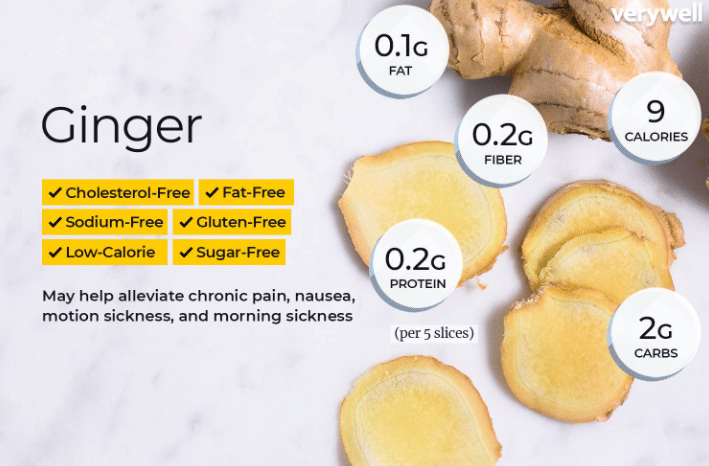Gingers, a humble root with a fiery taste, has been a staple in kitchens and medicine cabinets around the world for centuries. From its unique flavor to its potent medicinal properties, ginger is a powerhouse of health benefits that can transform your well-being. Dive into the incredible world of ginger and discover why this ancient spice deserves a permanent place in your diet.
The Nutritional Goldmine
Ginger is not just an ordinary spice; it’s a nutritional goldmine packed with essential vitamins, minerals, and bioactive compounds. Here’s a quick look at what makes ginger so special:

| Nutrient | Amount per 100g | Notes |
|---|---|---|
| Calories | 80 | Relatively low in calories, making it a healthy addition to a balanced diet. |
| Carbohydrates | 17.8 g | Primarily in the form of starches, providing energy. |
| Protein | 1.8 g | Contributes to a small amount of protein. |
| Fiber | 2 g | Supports digestive health and regularity. |
| Vitamin C | 5 mg | An antioxidant that supports immune function and skin health. |
| Magnesium | 43 mg | Essential for muscle function, nerve function, and blood sugar control. |
| Potassium | 415 mg | An electrolyte that helps regulate fluid balance and blood pressure. |
| Manganese | 0.2 mg | A trace mineral involved in bone health, metabolism, and antioxidant defense. |
| Gingerol | Varies | The primary bioactive compound in ginger, responsible for its pungent flavor and numerous health benefits, including anti-inflammatory and antioxidant effects. |
| Shogaol | Varies | A bioactive compound formed when ginger is heated or dried, also exhibiting anti-inflammatory and antioxidant properties. |
| Zingerone | Varies | Another bioactive compound found in ginger, known for its antioxidant and potential anti-cancer properties. |
Gingers’ Health Benefits
1. Anti-Inflammatory Powerhouse
Ginger is renowned for its powerful anti-inflammatory properties. The bioactive compound gingerol is the main force behind this effect. Regular consumption of gingers can help reduce inflammation, making it an excellent natural remedy for conditions like arthritis and other inflammatory diseases. Inflammation is the body’s natural response to injury or illness, but chronic inflammation can lead to severe health issues. By incorporating gingers into your diet, you can reduce the risk of chronic inflammation and improve your overall health.
2. Antioxidant Effects
The antioxidants in gingers help combat oxidative stress, which can lead to chronic diseases such as cancer and heart disease. By neutralizing harmful free radicals, gingers help protect your cells and keep your body healthy. Antioxidants are crucial in preventing cell damage and supporting the body’s natural defense mechanisms. Incorporating gingers into your daily routine can provide long-term benefits, safeguarding your body from the inside out.
3. Digestive Health
Gingers are a well-known remedy for digestive issues. It can alleviate nausea, reduce bloating, and improve overall digestion. Whether you’re dealing with morning sickness, motion sickness, or just a queasy stomach, gingers can provide quick relief. Its active compounds stimulate the production of digestive enzymes, enhancing the digestion process. Moreover, ginger’s anti-inflammatory properties help soothe the digestive tract, reducing the symptoms of indigestion and promoting a healthy gut.
4. Immune System Support
Thanks to its high vitamin C content and potent antioxidants, gingers help boost your immune system. Regular intake can help your body fend off infections and stay healthy year-round. The immune system is the body’s defense mechanism against pathogens, and maintaining a robust immune system is crucial for overall health. Ginger’s immune-boosting properties make it an essential dietary addition, especially during flu seasons or when you’re feeling under the weather.
5. Pain Relief
Ginger’s anti-inflammatory and analgesic properties make it effective in reducing various types of pain, including menstrual cramps, muscle soreness, and joint pain. Incorporating gingers into your diet can be a natural way to manage pain without relying on over-the-counter medications. Pain management is a significant concern for many people, and natural remedies like ginger offer a safer alternative to synthetic drugs. By reducing inflammation and blocking pain pathways, gingers can provide relief and improve quality of life.
6. Cardiovascular Health
Gingers support heart health in multiple ways. Its potassium and magnesium content help regulate blood pressure, while its ability to lower cholesterol levels reduces the risk of heart disease. Adding gingers to your diet can be a heart-healthy choice. Cardiovascular diseases are among the leading causes of death worldwide, and maintaining heart health is paramount. Ginger’s compounds help improve blood circulation, prevent clot formation, and reduce cholesterol levels, thereby supporting a healthy cardiovascular system.
7. Blood Sugar Regulation
Studies suggest that gingers can improve insulin sensitivity and help lower blood sugar levels. This makes it a beneficial addition to the diet of individuals with diabetes or those at risk of developing the condition. Blood sugar regulation is critical for preventing diabetes and managing its symptoms. Ginger’s active compounds help enhance insulin function and increase glucose uptake by cells, making it a valuable dietary component for blood sugar management.
8. Anti-Microbial Properties
Gingers contain compounds with anti-microbial effects, which can inhibit the growth of harmful bacteria and fungi. This makes ginger a natural way to support your body’s defenses against infections. The anti-microbial properties of ginger help maintain a healthy balance of microorganisms in the body, preventing infections and promoting overall health. Incorporating ginger into your diet can provide an extra layer of protection against common pathogens.
9. Weight Management
Gingers can aid in weight management by boosting metabolism and promoting a feeling of fullness. This can help reduce overall calorie intake and support healthy weight loss efforts. Weight management is a common goal for many people, and ginger’s thermogenic properties help increase calorie burning. Additionally, its ability to promote satiety reduces the likelihood of overeating, making it easier to maintain a healthy weight.
10. Mental Health and Cognitive Function
Emerging research suggests that ginger may have benefits for brain health. Its antioxidant and anti-inflammatory properties can protect against age-related cognitive decline, potentially reducing the risk of neurodegenerative diseases. Mental health and cognitive function are essential aspects of overall well-being. By protecting brain cells from oxidative stress and inflammation, ginger can support cognitive health and improve mental clarity, making it a valuable addition to a brain-healthy diet.
ginger’s potential benefits in those specific areas
1. Can gingers help lower blood sugar levels?
- Potentially, but more research is needed. Some studies suggest that ginger may modestly improve blood sugar control in people with type 2 diabetes. It appears to work by enhancing insulin sensitivity and improving glucose uptake by cells.
- Not a replacement for traditional treatment: Ginger should not be considered a replacement for conventional diabetes medications or a standalone treatment.
- Talk to your doctor: It’s crucial to consult your doctor before using ginger for blood sugar management, especially if you’re already taking medication for diabetes.
2. Is ginger effective in treating or preventing colds and flu?
- May help with symptoms, but not a cure: While ginger won’t prevent colds or flu, its anti-inflammatory and analgesic properties can help alleviate symptoms like sore throat, congestion, and muscle aches.
- Immune-boosting potential: Ginger’s antioxidant content may offer some immune support, but it’s not a guaranteed shield against viruses.
- Other remedies are important: Rest, hydration, and over-the-counter medications remain crucial for managing cold and flu symptoms.
3. Can gingers help with menstrual cramps and other female reproductive issues?
- Promising for menstrual cramps: Ginger has shown effectiveness in reducing menstrual pain, often comparable to over-the-counter pain relievers.
- Limited evidence for other issues: Research on ginger’s effects on other female reproductive issues like PCOS or endometriosis is limited and inconclusive.
- Consult your doctor: It’s essential to discuss any reproductive health concerns with your doctor for proper diagnosis and treatment.
4. Does gingers have any benefits for skin health or anti-aging?
- Antioxidant power: Ginger’s antioxidants can help protect skin from damage caused by free radicals, potentially slowing down premature aging.
- Anti-inflammatory effects: May help reduce skin inflammation associated with conditions like acne and eczema.
- Topical and internal benefits: Ginger can be applied topically or consumed to potentially reap its skin benefits.
- Not a miracle cure: Ginger is not a substitute for a well-rounded skincare routine and sun protection.
5. Can gingers help with stress, anxiety, or depression?
- Limited evidence, but potential: Some preliminary research suggests that ginger may have mood-boosting and stress-reducing effects, possibly due to its antioxidant and anti-inflammatory properties.
- Not a replacement for professional help: Ginger should not be considered a treatment for diagnosed anxiety or depression.
- Further research is needed: More studies are needed to understand ginger’s potential role in mental health.
Remember: While ginger shows promise in various areas, it’s essential to approach health claims with a critical eye and consult with healthcare professionals for personalized advice and treatment plans.
Incorporating Ginger into Your Diet
Fresh Ginger
Fresh ginger can be grated, sliced, or chopped and added to a variety of dishes, including soups, stir-fries, sauces, and marinades. It’s also great for brewing into a soothing tea. Fresh ginger provides the most potent flavor and health benefits, making it a versatile ingredient in both savory and sweet dishes. You can also add fresh ginger to smoothies for an extra health boost.
Ground Ginger
Ground ginger is a convenient option that can be used in baking, smoothies, and spice blends. It is more concentrated than fresh ginger, so a little goes a long way. Ground ginger retains many of the health benefits of fresh ginger, making it a practical choice for those who prefer a more convenient form. It can be easily incorporated into various recipes, from cookies to curry powders.
Ginger Tea
Ginger tea is a popular way to enjoy the benefits of ginger. Simply steep fresh ginger slices in hot water, and add honey and lemon if desired. Ginger tea is not only delicious but also offers a warm, soothing way to consume ginger. It’s perfect for cold days or when you’re feeling under the weather. Drinking ginger tea regularly can help you stay hydrated and reap the health benefits of ginger.
Pickled Ginger
Commonly served with sushi, pickled ginger is a tangy and refreshing way to cleanse the palate and enjoy ginger’s health benefits. Pickled ginger is often used in Asian cuisine and provides a unique flavor profile. It’s an excellent addition to salads, sandwiches, and rice dishes, offering both taste and health benefits.
Ginger Supplements
For those who may not enjoy the taste of ginger, supplements are available in various forms, including capsules, tablets, and extracts. Ginger supplements provide a convenient way to consume ginger’s health benefits without having to incorporate it into your meals. They are especially useful for those with busy lifestyles or specific health needs.
Everything about Ginger is here:The Amazing Ginger: A Must-Read Guide.
